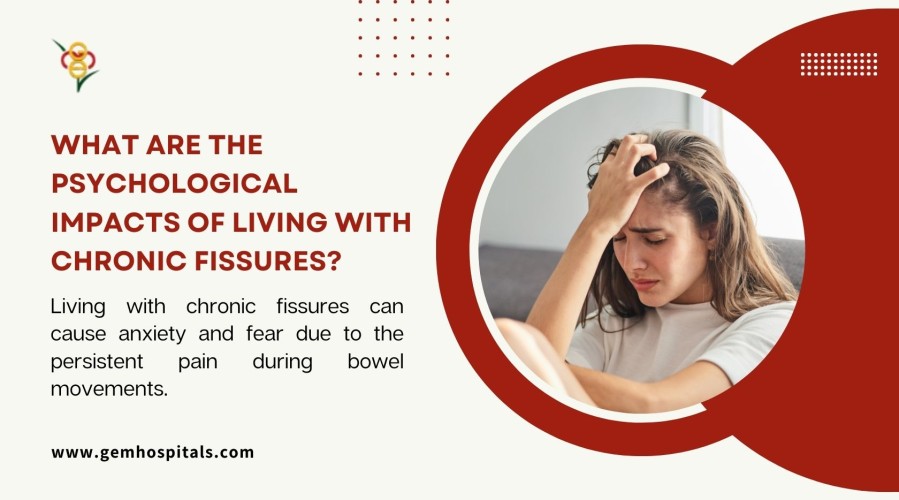Learn effective solutions for digestive problems with expert tips to improve gut health, reduce discomfort, and maintain a healthy digestive system.
What are the psychological impacts of living with chronic fissures?

Experiencing the anal fissure itself is a worse feeling because not only physically is an individual going to get affected psychologically due to their intense pain and discomfort caused by the fissure in that case the chronic anal fissures put additional distressing experience in an individual. An anal tear is nothing but a small tear in the anal canal which causes intense pain, especially during and after bowel movements. Physical symptoms are well-known and well-discussed but their psychological impacts often go unnoticed. This article explores the psychological challenges faced by individuals who are living with chronic fissures.
Understanding chronic fissures
Before you are to know about the psychological effects of chronic fissures it is vital to understand what chronic fissures are and how difficult to handle them physically. Fissures occur when the delicate lining of the anus tears, often due to the passing of hard stools or excessive straining during bowel movements. Chronic fissures are those that last longer than six weeks and can be recurrent, leading to constant discomfort, pain, and other symptoms such as bleeding, itching, and spasms of the anal sphincter. The pain from fissures is often described as sharp and severe, and because it is associated with bowel movements, many patients develop a fear of using the bathroom.
Fear and anxiety around bowel movements
Living with chronic fissures is a challenging task it also going to have psychological effects with the development of fear and anxiety surrounding bowel movements. During defecation, severe pain will be experienced. This fear can lead to a condition known as defecation anxiety, where people deliberately avoid going to the bathroom to escape the pain.
Unfortunately, this avoidance often exacerbates the problem, leading to constipation and harder stools, which can worsen the fissure and make bowel movements even more painful. This creates a vicious cycle that increases anxiety and contributes to the worsening of the fissure, prolonging the healing process.
Depression due to chronic pain
Chronic pain during bowel movements is a well-known contributor to depression, and individuals suffering from chronic fissures are no exception. They may become frustrated with the lack of relief and find it difficult to enjoy once pleasurable activities. People with chronic conditions like fissures may find it difficult to find the right treatments that work. When solutions fail to provide relief, feelings of hopelessness and despair can set in. The longer the condition persists, the more likely it is to take a toll on a person’s mental health.
Sleep disruptions
Pain from chronic fissures often persists even after bowel movements, sometimes lasting for hours. This lingering pain can disrupt an individual’s sleep patterns, causing insomnia or poor-quality sleep. Sleep deprivation can worsen feelings of anxiety, depression, and irritability, creating a negative feedback loop where poor mental health exacerbates the physical condition, and vice versa.
The lack of rest and recovery not only affects an individual’s mental state but also delays the healing process. Sleep is essential for tissue repair and immune function, and sleep disruptions can slow the body’s ability to heal fissures naturally.
Psychological support
Managing the psychological effects of chronic fissures is just as important as addressing the physical symptoms. Fortunately, there are several ways individuals can cope with the mental and emotional challenges of living with chronic fissures.
- If the emotional burden becomes overwhelming, individuals should not hesitate to seek help from mental health professionals. Therapy or counseling can provide a safe space to discuss feelings of anxiety, fear, and depression, and can offer practical coping strategies.
- Eating a high-fiber diet and drinking plenty of water can help prevent constipation and reduce the strain during bowel movements. Making these dietary adjustments can ease anxiety and improve overall digestive health.
Living with chronic anal fissures is not simple as you think being emotionally and mentally weak will snatch your happy days from any individual. Through adopting the right strategies and support it is possible to control both the physical and emotional impacts of chronic fissures and also helps in enhancing overall quality of life.
Blogs & Article
Explore current research trends in digestive health, including new treatments, advanced diagnostics, and innovations improving gut health and patient care.
Discover common digestive health myths and the real facts. Learn simple tips to improve gut health and maintain better digestion for a healthier life.


